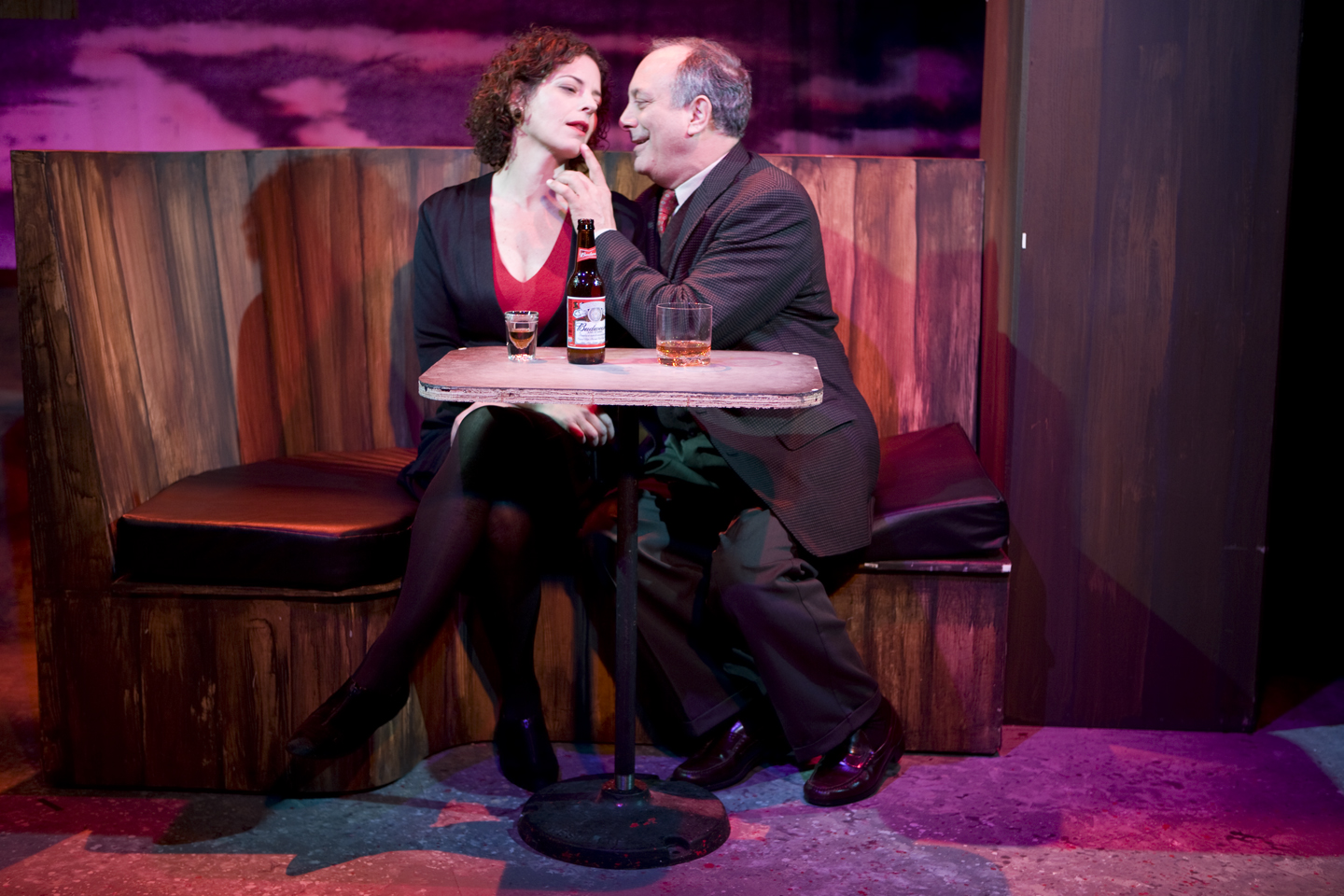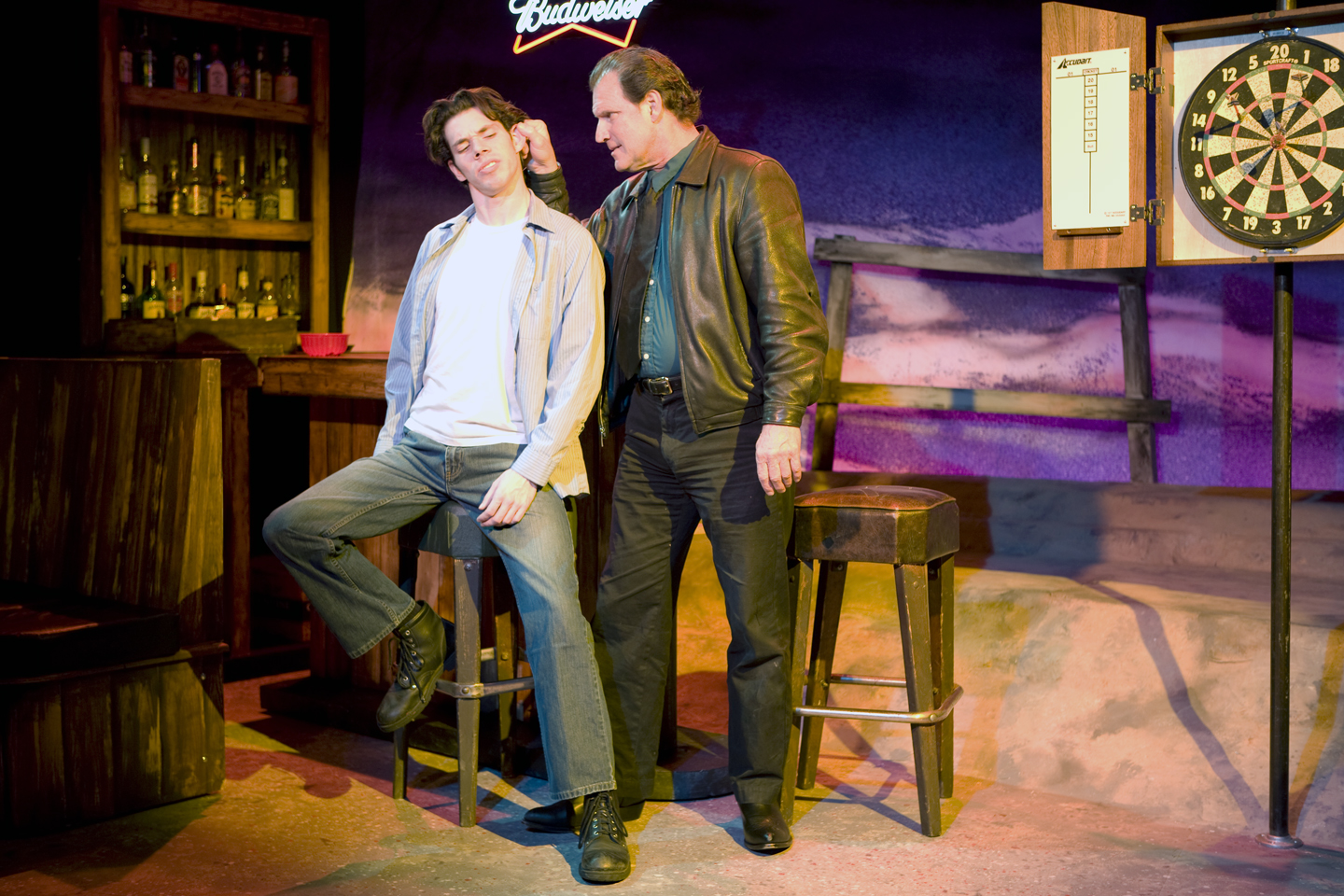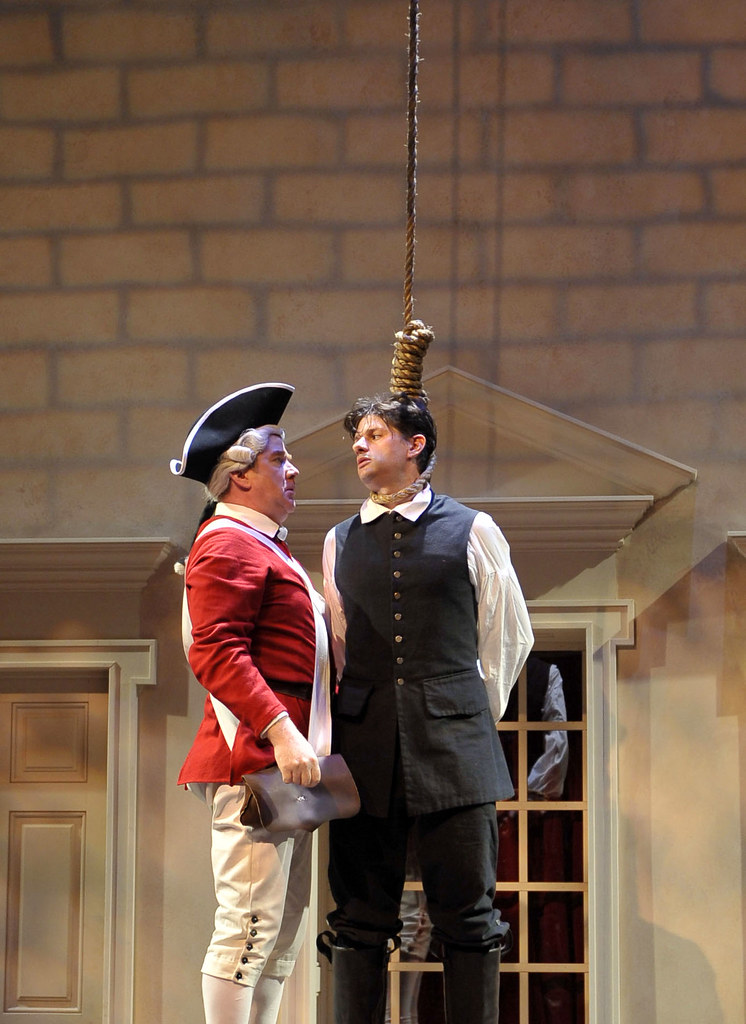
Michael Ray Wisely (left) is a British soldier and Gabriel Marin is Dick Dudgeon, a man about to hang even though he’s not the man the Brits think he is in the Aurora Theatre Company’s production of The Devil’s Disciple by George Bernard Shaw. Photos by David Allen
Aurora’s comic melodrama goes to the `Devil’
««« ½
The Devil’s Disciple, the Aurora Theatre Company’s latest offering, is funny as hell.
Leave it to the Aurora and the ever-reliable director Barbara Oliver to expand their list of sparkling George Bernard Shaw productions. This is Oliver’s seventh Shaw play for the Aurora, a company she helped found, and her sure hand helps team this somewhat beastly Devil.
Produced in 1897, The Devil’s Disciple was Shaw’s first success in the United States (we’re told it toured the country with a cast of 33 and a marching band), and it is his only play set in America, though technically the play, set in 1777, actually takes place in the colonies during the early years of the Revolutionary War.
Oliver’s crisp production makes do with nine engaging actors and no marching band. John Iacovelli’s set, with the help of Jarrod Fischer’s lights, transforms quickly and effectively from one spare New Hampshire home to another, to a courtroom and then, with a few swift adjustments, to a town square outfitted for a hanging.
The fact that death and war loom over Shaw’s comedy makes it rather tricky to pull off and perhaps accounts for the play’s infrequent production. But Oliver and her actors quickly find a way to balance the tone so that Shaw’s incisive humor and wry satire mix with his melodrama and his rather serious thoughts on oppression, independence and hypocrisy.
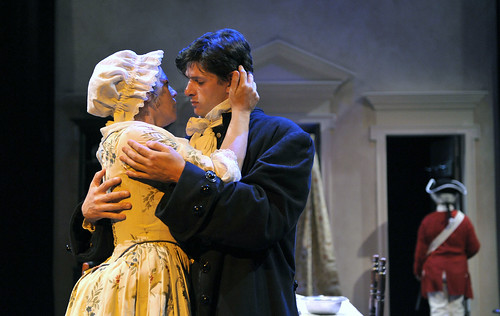 Gabriel Marin plays Dick Dudgeon, a self-proclaimed “devil’s disciple” who is reported to be a gambler, a swindler and one who runs with the gypsies. From what we know of Dick’s family – his piously pitiless mother (a wonderfully grumbly Trish Mulholland) and oafish brother (Anthony Nemirovsky) – it’s no wonder the man flew the family coop and embarked on a blasphemous life of crime and infidelity. He’s a proud reprobate, and his pride is evident in Marin’s every swagger and sideways grin.
Gabriel Marin plays Dick Dudgeon, a self-proclaimed “devil’s disciple” who is reported to be a gambler, a swindler and one who runs with the gypsies. From what we know of Dick’s family – his piously pitiless mother (a wonderfully grumbly Trish Mulholland) and oafish brother (Anthony Nemirovsky) – it’s no wonder the man flew the family coop and embarked on a blasphemous life of crime and infidelity. He’s a proud reprobate, and his pride is evident in Marin’s every swagger and sideways grin.
On the occasion of his father’s death, Dick has inherited everything, including the palpable disdain of his pinched, prudish family. Strangely, Mr. Anderson (Soren Oliver in a robust performance), the Calvinist minister, sees something in Dick that belies the man’s dastardly reputation, but Anderson’s wife, Judith (Stacy Ross, above, with Marin), is so disgusted with the rogue that she recoils from him as if his devilishness were contagious.
Shaw stacks everything in Dick’s favor so that, in reacting to the ridiculous people around him, we see what a good man he is – his paternal attentions to his late uncle’s bastard child (played by Tara Tomicevic) provide irrefutable proof. It’s all a set up so that when, via mistaken identity, Dick is carted off by the Redcoats to be hanged in the town square, we know Dick will do the honorable thing and continue pretending that he is indeed the minister.
This honorable act, coupled with her husband’s cowardly dash to safety, so surprises Judith that her faith is completely shaken.
Purple melodrama and blue humor give way to red-coated comedy in the second half when the Brits go through the motions of giving Dick (aka the minister) a “trial” before they hang him. Warren David Keith, playing the real-life Gen. John Burgoyne, all but steals the show as a sensible man among twits (Allen McKelvey and Michael Ray Wisely play his bumbling comrades).
Burgoyne strikes up an almost immediate admiration for Dick and his gentlemanly ways, and the process of sending the man to his death is so bloody civilized it’s a riot.
Keith and Marin spar wonderfully, and the laughs just get bigger and bigger, stopping only when the noose is actually fitted around Dick’s neck.
True to the two-hour play’s melodramatic strains, Shaw ties things up neatly, even heroically. He leaves poor Judith, pulled from one man to another and back, flapping in the patriotic breeze, but everyone, even the British soldiers, receives a just resolution. And the audience is left to ponder the historical significance of the devils among us.
FOR MORE INFORMATION:
The Devil’s Disciple continues through Dec. 7 at the Aurora Theatre, 2081 Addison St., Berkeley. Tickets are $40-$42. Call 510-843-4822 or visit www.auroratheatre.org .

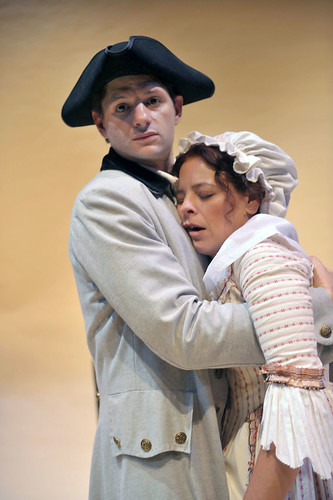 The Aurora Theatre Company’s next show, George Bernard Shaw’s The Devil’s Disciple, is packed with the kind of actors who, if you care about local theater, you’ve been watching for years. Names such as Stacy Ross, Warren David Keith and Trish Mullholland pretty much make a show worth seeing if they’re involved.
The Aurora Theatre Company’s next show, George Bernard Shaw’s The Devil’s Disciple, is packed with the kind of actors who, if you care about local theater, you’ve been watching for years. Names such as Stacy Ross, Warren David Keith and Trish Mullholland pretty much make a show worth seeing if they’re involved.
 “I cannot thank my son enough,” Marin says. “He’s had to sit in a lot of green rooms. He’s the light of my life. What’s interesting, is when I bow, I make an `M’ with my hands, and if he’s in the green room, he’ll run out to the wings to see if I give him thanks. I couldn’t act if he wasn’t on board.”
“I cannot thank my son enough,” Marin says. “He’s had to sit in a lot of green rooms. He’s the light of my life. What’s interesting, is when I bow, I make an `M’ with my hands, and if he’s in the green room, he’ll run out to the wings to see if I give him thanks. I couldn’t act if he wasn’t on board.”




